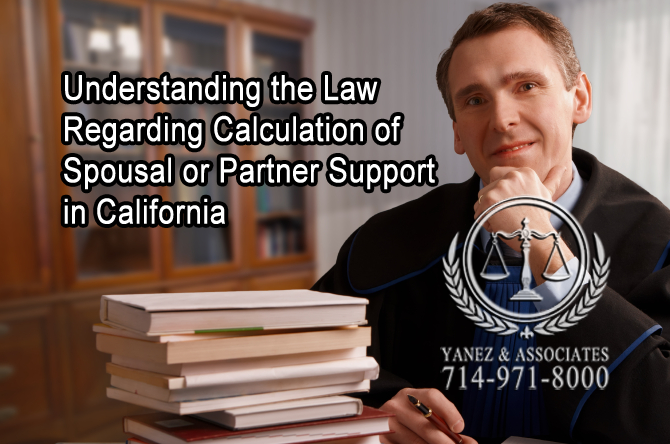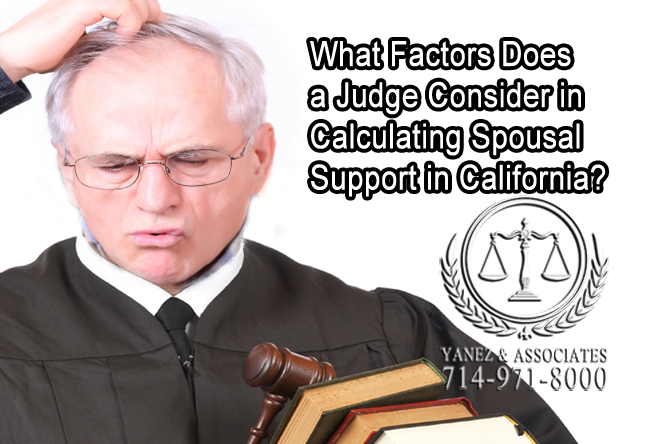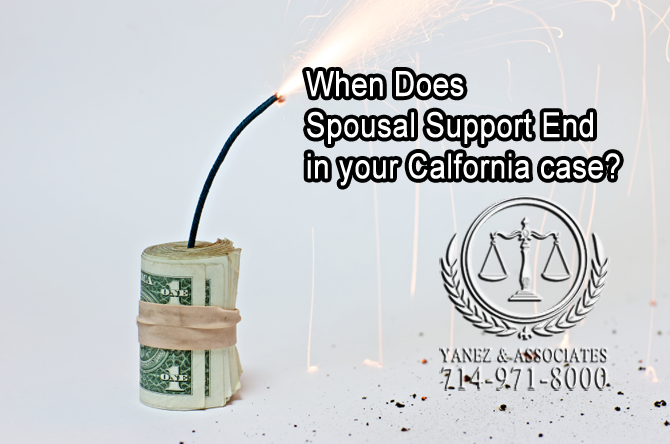Learn how your Alimony is Calculated in Orange County, California
How Is My Alimony Calculated in Orange County CA? In the most general terms, spousal support, also called alimony, is calculated in California based on each spouse’s income and filing status. You can find spousal support calculators online that can help you estimate whether spousal support will be necessary, who may be responsible for paying, and what the estimated monthly and yearly payments could be.
A spousal support order should also consider each spouse’s marketable skills, the potential for each spouse to be hired with those skills, any periods of unemployment or child care, the extent to which extenuating circumstances may affect either spouse’s ability to earn, either spouse’s ability to gain education or training, and more.
Spousal support can also potentially be modified prior to ending, or terminated in certain circumstances. Every couple is unique, and if you have questions about spousal support or partner support, it is important to discuss your situation with a qualified spousal support lawyer in Orange County.
When Can I Request a Spousal Support Order?
If you are looking to initiate spousal support payments, you can do so either in one of the following four family law cases in California:
• During or following a divorce,
• During or following a legal separation,
• During an annulment,
• During a domestic violence restraining order case or following the issuance of a domestic violence restraining order.
During any of the above mentioned cases, a temporary spousal support order may be issued if the judge deems it necessary. A spousal support order that is issued as part of the closing of any of these cases is a long term or permanent spousal support order.
What Factors Does a Judge Consider in Calculating Spousal Support in California?
Temporary spousal or partner support orders may vary by county. Temporary spousal or partner support is calculated based on the immediate need and financial independence of both parties.
When it comes to permanent or long term spousal support, it is unlikely that a judge will use a formula to calculate spousal support. Instead, he or she will consider certain factors that may affect the couple after a divorce, legal separation or domestic violence restraining order. These factors can include, but are not limited to the following:
• The extent to which each spouse or partner’s earning capacity can allow the parties to maintain the standard of living that was established during the marriage;
• Each partner or spouse’s marketable skills, and the likelihood of obtaining a job from those skills, including any time or costs that may be necessary for either party to complete the necessary education or training to obtain marketable skills;
• Any unemployment gaps due during the marriage due to childcare or other circumstances, and how that may affect the supported party’s ability to find gainful employment;
• Any contribution that the supported party made to the education training, career, etc. of the supporting party;
• The ability of the supporting party to pay spousal support;
• The financial needs of both parties;
• The length of the marriage;
• The supported party’s ability to find gainful employment, considering any dependent children that may be in his or her custody;
• The age and current health of both partners or spouses;
• Any history of domestic violence between the spouses or partners, or directed towards any children they may have;
• The tax consequences of spousal support to either party;
• Anything else that the court determines is relevant to the determination of spousal support.
Understanding the Law Regarding Calculation of Spousal or Partner Support in California

If a marriage or partnership has lasted for ten years or more, or the judge considers it a long term marriage or partnership...
The goal of spousal support is to allow both spouses to maintain a similar standard of living to what they had attained during their marriage. To do this, the judge aims to allow either spouses or partners to obtain gainful employment. However, if one spouse was not employed during the marriage due to domestic duties or other circumstances, his or her ability to find employment may be impaired. The judge will consider the factors that may affect this while determining spousal or partner support.
Length of the Marriage or Registered Domestic Partnership - The length of the marriage or domestic partnership is important because it affects the length of time for which the spousal support order will likely be valid. Generally speaking, the amount of time that it takes for the supported spouse or partner to support him or herself is about one half the length of the relationship. However, the judge may make a determination based on other factors to extend or shorten the term of the spousal support order.
If a marriage or partnership has lasted for ten years or more, or the judge considers it a long term marriage or partnership, the judge may not set an end date to the spousal support order.
Domestic Violence - In the case of domestic violence, the judge may also consider any emotional distress caused by the violence, and award spousal support accordingly. If the victim is the supporter, the judge may also consider not awarding spousal support to the abuser.
When Does Spousal Support End in my California Case?
Most spousal support orders end when the order says that it ends. If the judge does not choose to list a term length in the spousal support order, it may end if either spouse or partner dies, or if the supported person either married or legally registers a new domestic partnership.
If you are facing circumstances where you believe that your spousal support order should be terminated, it is important to discuss your case with a spousal support lawyer and consider filing a case for a modification of a spousal support order.
Spousal Support Order in Orange County, California
Contact a California spousal support lawyer as soon as possible. Contact Yanez & Associates today to schedule your free initial consultation.

If you are filing for divorce, a legal separation, or getting an annulment, or if you are in a domestic violence restraining order case, you may be eligible for a spousal support order in California.















